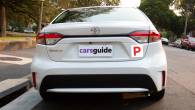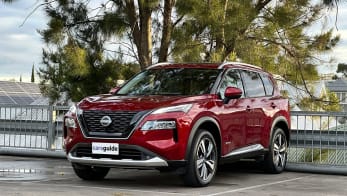Carmakers spend millions of dollars squeezing every last little bit of fuel consumption out of the cars we buy, but all of that hard work can be for nothing if we don't do our bit once we take the wheel.
With a little care and common sense we can build on the carmaker's good work and make our cars even more economical.
1. Don't carry unnecessary loads
Weight has a major effect on fuel economy. Reducing weight is one of the things carmaker's spend their millions on in search of the ultimate fuel economy.
But all of that work can mean little if we drive around with a boot loaded with things we don't really need to carry with us.
-wide.jpg)
Remove everything you don't need and leave it at home.
The same applies to the cabin. Our cars are jam-packed with storage bins, pockets, consoles and glove boxes, and they're all places we can easily stow things. Before we know it they can be full to overflowing with bits and pieces that aren't needed, so go through all of them and empty them out.
2. Let the air flow
If weight has a major impact of fuel economy so too does a car's aerodynamics. Anything that disrupts the smooth flow of air over, under and around our car as we drive along will have a negative effect on fuel consumption.
The smoother our car is able to move through the air the easier it will be on the engine to do its job.
Never leave a roof rack on your car if you don't need it to be there. A roof rack is for carrying things, if it's not needed for that it shouldn't be there.
All it does is disrupt the vital airflow over the car, forcing your engine to work harder than it should have to.
Likewise driving along with your windows open adversely affects the airflow along the sides of the car, so drive with the windows up whenever you can.
Allowing mud or dirt to build up will have the effect of disturbing the airflow over the surface of your car, and will cause your fuel consumption to increase. Keeping you car clean will allow the air to flow more smoothly.
3. Keep the tyres correctly inflated
Always keep your tyres inflated as per the carmaker's recommendations. Letting the pressure drop reduces the effective rolling radius of the tyres and increases their rolling resistance and that forces the engine work harder than it should have to and consume more fuel.
Inflating your tyres to a slightly higher than recommended pressure can have a positive affect on fuel economy by increasing the rolling radius and reducing the rolling resistance.
-wide.jpg)
However, increasing the inflation pressure will affect other things, such as the ride comfort, and that might not be to your liking.
If you're not sure seek the advice of your tyre retailer.
4. Maintenance works
Anything that makes the engine in your car work harder than it needs to will have a damaging effect on your fuel economy.
Skipping services, in particular oil changes, can lead to a build-up of sludge in your engine. Sludge in oil not only shortens the life of your engine, but it makes it harder to move the oil around the engine. The engine has to work harder and it consumes more fuel as a result.
Regularly changing the air filter will also have a positive effect on fuel economy. A filter that's partly blocked with dust or debris will reduce your engine's ability to breathe efficiently.
A properly tuned engine will also be a more fuel-efficient one, so checking your spark plugs is worthwhile, and resetting the gap to the recommended setting is something to think about if you're handy with the spanners.
5. Drive smoothly
We are the ones who mostly determine the fuel economy we ultimately get from our cars. The key to fuel economy lies under our right foot. Press down hard on the accelerator and we'll use fuel faster, ease up on it and we'll save.
Don't race up to traffic lights that are changing and then brake hard
It's easy really. Don't accelerate hard away from the traffic lights, ease away using a lighter pedal, change up to a higher gear earlier, and maintain a steady throttle as much as you can.
Look ahead and anticipate what the traffic is going to do. Don't race up to traffic lights that are changing and then brake hard to a stop, ease off and roll to a rest.
6. Be smart when you cruise
Many drivers set the cruise control and forget about it, but being smart about using it can save you fuel.
Your cruise control is designed to maintain the speed you set, and that works well on flat open roads, but it's not so great when you come to hilly country.
In trying to maintain your set speed on hills the cruise will often accelerate quite hard to make up for speed lost using up fuel in the process. Instead, take control of the throttle when you're driving in hilly country and you'll save fuel by being easier on the gas.



.jpg)


.jpg)

.jpg)
 copy.jpg)


.jpg)

.jpg)



.jpg)
Comments